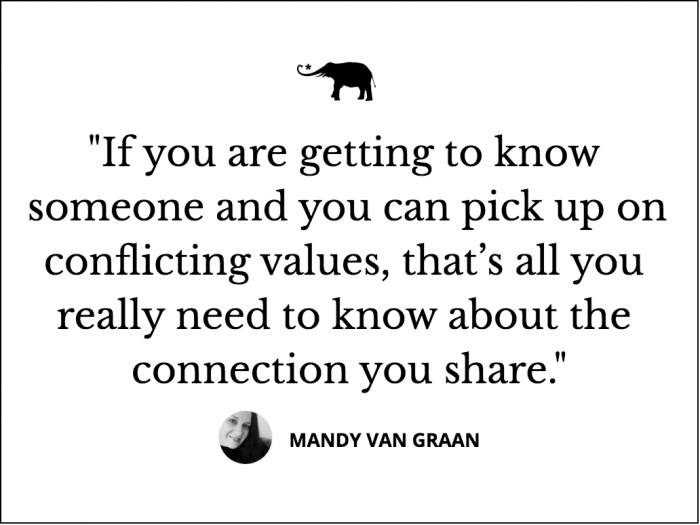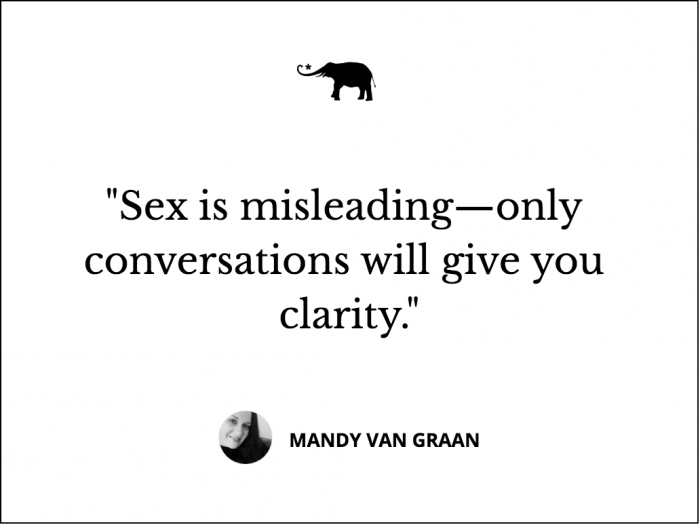If your dating life has been anything like mine, you need about seven years on a private island—completely alone, focused solely on healing. (Then possibly another seven so that the message finally sinks in.)
I’ve been a serial dater for many years—partly because I am a recovering love addict, and partly because I have been unhealthily codependent.
I truly believe, as humans, we are all codependent; we thrive in genuine and intimate connections (the healthy kind of reasons to attach to one another). The unhealthy kind of codependent is when we do anything possible to avoid being alone and stick around in toxic situations because of it.
I have jumped from one relationship to the next, something I am not proud of typing, but a truth nonetheless. And I am always attracting exactly what I am, which has predominantly been reflecting my own emotional unavailability and trauma-based behaviors and reactions (with one true narcissist thrown in the mix).
And lately, red flags have been on my mind.
Anyone I engage with has a string of red flag stories. We can’t deny that we are all too eager to share them. I always have a real-life laugh-out-loud moment when I think of, “Look, I made a scarf from all the red flags you gave me.”
But I couldn’t help but wonder, what are some of the red flags?
Thanks to my vast and often tumultuous experiences, I am well-versed in red flags, often handing them out by the dozen myself or seeing them and completely ignoring them against my better judgment.
But what are the behaviors (the characteristics) of dating someone who shows us all the wrong things or how we are doing the wrong things?
1. You don’t share common values.
I once dated a man who would lie about everything. Everything. I am not overexaggerating; the man valued bullsh*t more than he valued honesty.
Honesty was difficult for him. It meant being vulnerable; it meant being accountable and responsible for actions, and he simply didn’t see it as a way to live his life. He got what he wanted, when he wanted it, by essentially being (by my own definition) a d*ck.
Even if people were hurt in the process, he didn’t care about the consequences. It was his show, and we were all simply cast as extras. Was he happy? That’s another article entirely, but you can guess the answer.
Our values make us who we are.
Our values guide our decisions, our behaviors, and our thoughts. They are the script that plays in our heads on how we show up in the world.
If we value honesty, trust, loyalty, kindness, ambition, success (and you can delve even deeper into that one, what does success mean to you?), a glaring red flag is someone who doesn’t share those values.
This is one of the most important things I have come to learn about relationships. If you are getting to know someone and you can pick up on conflicting values, that’s all you really need to know about the connection you share.
2. You don’t want similar things.
Where do you see yourself in five years?
If you’re like me, you’ve saved enough to go travelling and see parts of the world scribbled onto your bucket list. In my mind, nothing broadens perspective more than travelling.
This means that if I were to start dating again (and #notanytimesoon), it would have to be with someone who wants to travel versus someone who wants to settle down and maybe have a couple of kids and the white picket fence vibe (although, I think I may be past my prime on that one).
Opposites attract is a fallacy. Opposites implode is more apt.
Someone who is outgoing and adventurous, who wants to try new things, isn’t going to date someone who wants to sit at home all the time, watching endless amounts of series. Well, technically, they can, and they’ll discover that it’s one of the biggest reasons couples split.
Our happiness follows the path we choose for ourselves; happiness is subjective, and it’s dependent on our values, beliefs, and interests. This needs to align with someone else or it’s going to end.
3. You can’t be yourself.
Obvious? You’d think so, but I think that many of us, myself included, spend far too much time molding ourselves into what we think someone would want versus being true to ourselves (maybe out of relationship desperation or out of not knowing ourselves well enough).
I remember a man saying to me rather bitterly while talking about a previous relationship, “What did she think? That I was going to change?” and instead of listening to the sirens that were going off in my head, I shrugged and laughed. It’s a moment I won’t forget because it was a moment that I abandoned myself.
My true-to-myself answer would have been, “Yes, she probably thought you would. She probably thought that she liked you and that if you spent enough time together, you would start doing the things she valued.”
Was it his fault for not seeing that? No, he was probably honest about who he was from the get-go, but she had created expectations he would never meet.
And how many of us can say, with raw honesty, that we have been there? Trying hard to keep something going that we know on a core level is not meant for us.
I’ll raise my hand and say that I never want to find myself in a position like that again.
4. You don’t feel safe.
I can say with shame that I have felt utterly unsafe with about 90 percent of the people I have chosen to date. Every time I saw them or interacted with them, my body was signaling in profound ways.
I was oftentimes shaky, unsure of myself, nervous, and sweaty. I chalked it up to lacking confidence, but truthfully, I felt unsafe.
There was something that those people had shown me, said to me, done to me that had clued me in on who they were and what they were about, and I chose to stick around.
When you spend time with people who make you feel safe, you are unguarded, you are relaxed, and you are comfortable.
Don’t ignore how the emotion of feeling unsafe is sending you a message that you shouldn’t be there or that the connection is based on nothing real or solid.
5. A whole lot of sex and little conversation.
An orgasm is a powerful motivator for many of us.
Sex can cloud our judgement. We’re sharing intimate spaces with someone else, sharing our energy, and it can often blind us to how strong the connection really is because we have tied so much of it to the physical.
I’ve been with men where sex is the dominant factor, and once it’s taken away, all that is left is the sound of crickets.
It’s important to wait.
It’s important to build intimacy—not in the sheets, but in the streets.
It’s important to get to know someone before you take your kit off, and that’s not a judgment; that’s a hard truth I had to face about my own behavior.
Sex is misleading—only conversations will give you clarity.
6. Irresponsible, immature, and unreliable behavior.
Some people have trouble mastering basic life skills. Taking care of themselves, managing their finances and personal space, holding onto a job, making solitary plans for themselves and their future.
If there is one pet hate I have, it’s someone who is unreliable; it goes against my own value in a big way. Being reliable for me ties in with respect—not only for yourself but for others.
As adults, we all have moments of being irresponsible, moments of being immature, and moments of being unreliable, but if we find ourselves dating someone who is consistently promoting these three behaviors, they need to grow up—before they can even think about being a partner and what that means.
Healthy relationships are all about responsibility, maturity, and reliability. Date an adult who understands that these three things don’t mean boring; they mean showing real and consistent love, for yourself and who you are with.
7. The need to feel needed.
This is one I have struggled with for most of my life. I needed a partner to make me feel worthy, valued, and secure. I needed someone else to do what I wasn’t doing for myself, and it’s the reason most of my relationships have ended.
I must have helped make many scarves out there. *hangs head in shame*
This has been my own biggest red flag.
Fulfilment of our own needs comes from only one place: within ourselves.
Saving people, making others feel worthy and secure, and providing for others is not genuine love, and expecting it is not genuine love. Genuine love is showing up in support of someone’s happiness, not being responsible for it.
Red flags seem to be on everyone’s lips at the moment, and I’m happy about that, because while I believe we can avoid hurtful and distressing situations when we see a red flag and choose to heed its warning, it also gives us insight into how we show up in relationships.
What are our red flags?
Where is the opportunity for our own growth?
~














Read 20 comments and reply